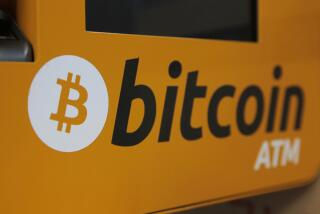Their money, his life in China
- Share via
BEIJING — It seemed like a gift from heaven in a country where very little is free. When security guard Xu Ting went to an ATM in the southern city of Guangzhou on a Friday night in the spring of 2006 and withdrew $140, he noticed that it only deducted 14 cents from his account. Over the next eight hours, he made 170 more withdrawals, pocketing upward of $24,000.
During the next several months, he lost some of the money to a thief on a train, tried to start up a company that failed, and gambled most of the rest on thousands of lottery tickets that turned out to be losers. With little cash left, he got a job.
Then a routine police ID check led to his arrest.
Xu’s disappointment at how little the windfall had changed his life was nothing compared with what happened next. He was ordered imprisoned for life by a Chinese court late last year. The crime: bank robbery.
Xu’s case has attracted widespread attention in China, fanning public ire at the judiciary, the banking industry and corrupt officials who get away with far greater crimes than ordinary people who can’t get a break.
Fearful of the growing anger over perceived injustice and China’s widening rich-poor gap, the government late last week held a retrial for Xu, a rarity in a country where the state is presumed to always be right. A verdict could be announced as early as the end of the week.
For Xu’s father, the initial court decision suggests China’s laws have not kept up with societal changes or common sense, a view some legal experts share.
“My son is not a bad kid, but it’s such a money society,” said Xu Cailiang, his father. “I don’t know much about the law, but I think this sentence is totally unreasonable. Ninety percent of people in China would have taken the money.”
That figure may be conservative. In an Internet survey in late December, just 7% of 19,437 respondents said they would stop withdrawing money and promptly report the mistake to the bank.
“We are not saints,” said an anonymous posting on a popular website, Tencent.com.
Xu’s father, 50, says his son can hardly be expected to follow the sort of mores he did growing up. When Chairman Mao led the nation, most people were scrupulously honest and society shared a common sense of purpose.
“The difference between then and today is like heaven and earth,” he said. “Now everything depends on connections and graft. It’s a slippery slope.”
In the last decade, credit and debit card usage has exploded in China, with anger toward banks fanned by poor service in the state-run banking sector.
“The customers have seen enough of their arrogance and snobbishness,” said a recent article on the Dahe News government website.
Supporters say Xu’s bank is partly to blame for not maintaining its ATM. They also note that the bank never actually suffered a loss, since the $24,000 was refunded by the ATM manufacturer. “The analogy in Xu’s case might be to someone finding money on the street and not turning it in,” said Wu Yichun, Xu’s lawyer. “This should be a civil, not a criminal, case.”
Others slam China’s banks for cheating their customers without penalty even as Xu got a life sentence. Internet postings criticize financial institutions that refuse to reimburse customers after their ATMs spit out counterfeit bills or blank “test” paper. In one case cited online, a Mr. Chen from Beijing discovered $14 from the ATM he was using was fake. The bank refused a refund on the grounds he didn’t have evidence it came from its machine.
In another case, a Chongqing man surnamed Huang, who declined to give his first name, had a similar experience with $30. Eventually he became so infuriated with the bank’s unresponsive attitude that he attacked and damaged the machine.
Others claim “ATM phobia” after the Xu case, fearful a machine will spit out more than expected and land them in trouble as well.
And an article from Britain’s Daily Mail that was widely circulated in China tells of a similar ATM in Bristol that, in October 2006, spit out 20 pounds for every 10 pounds withdrawn. That turned into a giant street party. Why, when it happens in China, does Xu get life imprisonment? several Internet postings asked.
In recent months, the anger over banks has become more pronounced. Foreign banks have started building a presence here after international trade rules forced China to open the market, and the differences are not going unnoticed.
Until now, Chinese consumers had little choice but to go to a state-run bank. One survey found the average waiting time at China’s four largest financial institutions was 41 minutes.
Another survey, released last year on the Dahe News site, found 79.5% of Guangdong residents would opt for a foreign bank over its domestic counterparts.
If an ATM shortchanges you, spits out something other than money or misdirects a transfer, it’s always the customer’s fault, complained online user “ifzhangwei” on Tianya Club, a social networking site. “Never let a bank suffer a cent of loss, otherwise it will sue you. If you’re lucky, you’ll go bankrupt, if not, beheaded.”
China’s love-hate relationship with the ATM is a relatively short one. The first machine was installed in southern Guangdong province by the Bank of China in 1986, a few miles down the road from Xu Ting’s fateful experience. But ATMs didn’t gain widespread use here until almost 2000.
China is now one of the world’s fastest-growing ATM markets, with approximately 120,000 of the world’s 1.7 million machines, according to London-based analyst Retail Banking Research. That compares with about 408,000 in the U.S.
While growing frustration with banking services and ATMs appears widespread, perhaps most worrisome for Beijing are the awkward questions being raised about justice in this nominally socialist society. Internet users were quick to compare Xu’s life sentence to the often lenient penalties given to officials on the take, a contrast that doesn’t thrill the Communist Party.
“Compared with Xu Ting, the corrupt officials deserve a thousand deaths,” said an anonymous comment on Tianya Club. “China’s judicial system allows officials to set a fire while forbidding ordinary people to light a lamp.”
Every few years, China has a case in which public outrage prompts the government to reverse course, leading to social change.
In 2003, migrant worker Sun Zhigang was beaten to death by police; the outcry resulted in fewer restrictions on people moving within the country. In 2005, She Xianglin was found innocent after 11 years in jail on a murder conviction, spurring death penalty reform. Xu Ting’s lawyers hope his case can help bring more common sense to China’s theft statutes.
The judiciary has defended its decision even with the retrial. “Xu Ting’s case is totally in line with the judicial procedure,” said Lu Botao, chief of the Guangdong Supreme Court. “People shouldn’t get too emotional.”
Xu Ting, who grew up in Linfen, a small city in northern Shanxi province, has adapted to his life in prison, according to his lawyer, but is hopeful for a reduced sentence.
Xu studied marketing at a two-year college before dropping out to become a motorcycle salesman. He moved to Guangzhou and was working as a security guard until that day in April 2006 when he discovered the defective ATM.
His father describes him as hard-working and more ambitious than many of his peers, while his mother, Yang, speaks of a shy boy respected by his employers. From a young age, Xu dreamed of making something of himself, his family said.
Wu, his lawyer, said he couldn’t comment on Xu’s fundamental honesty, although he said he wasn’t an “eel-like person.” Withdrawing cash 171 times consecutively, however, suggests he doesn’t think much about consequences, Wu added.
Xu told reporters at his retrial last week that he stopped when the machine ran out of money, according to local media. He planned to go back a few hours later for more after the machine was refilled, but slept through his alarm. It was daylight by then and he decided to stop at $24,000.
He quit his job, bought a $100 cellphone, used $600 to pay off debts and gave $280 to his grandmother.
When the bank discovered the loss and started calling him, Xu fled to his home province. On the train, someone stole $7,000 he had in his coat, his father said, sending him on a downward spiral.
His boss called and tried to convince him to turn himself in, but Xu declined, his father said, explaining that he wanted to make the debt whole first. He invested $14,000 in an Internet cafe with a partner, which failed, then bought thousands of lottery tickets before the ID check led to his arrest at a train station.
“He’s a little naive,” his father said. “And he’s unlucky.”
His parents maintain his innocence: Their son didn’t consider it theft. He took the money to protect it for the bank. He wanted to turn himself in only to have a friend discourage him. A real criminal wouldn’t use his own ID.
Justice should be impartial, but things don’t work that way in China, Xu’s father said, suggesting that the court might have come to a different decision if Xu or his family was rich and had connections.
“Our family is like a little drop of water to the big sea that is the nation,” he added. “But if this case helps China improve its legal system, that would at least be something.”
--
Gao Jing and Zhang Guangqin in The Times’ Beijing Bureau contributed to this report.
More to Read
Sign up for Essential California
The most important California stories and recommendations in your inbox every morning.
You may occasionally receive promotional content from the Los Angeles Times.













